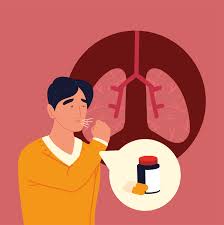
Cough Syrup: Easing the Irritating Symptom of Cough
Coughing is a common reflex action that helps clear the airways of mucus, irritants, and foreign particles. While coughing is a natural defense mechanism, it can become bothersome when it persists and disrupts our daily lives. Thankfully, cough syrup, a time-tested remedy, has been providing relief from coughs for generations.
Understanding Cough Syrup:
Cough syrup is a liquid medication specifically formulated to alleviate cough symptoms. It typically contains a combination of active ingredients that help soothe irritated throats, suppress cough reflexes, and reduce inflammation. The formulation of cough syrup may vary, offering different types for dry coughs, wet or productive coughs, and other specific conditions.
Types of Cough Syrup:
Antitussives: These cough syrups work by suppressing the cough reflex in the brain. They are commonly used for dry, non-productive coughs and help alleviate the urge to cough.
Expectorants: Expectorant cough syrups are designed to help thin and loosen mucus in the airways, making it easier to cough up phlegm and clear the respiratory passages.
Combination Syrups: Some cough syrups combine both antitussive and expectorant properties, providing comprehensive relief for various types of coughs.
Cough Syrups for Specific Conditions: There are also specialized cough syrups formulated to address specific conditions, such as allergies, sore throats, or chest congestion.
The Role of Active Ingredients:
Cough syrups contain active ingredients that play a pivotal role in providing relief. Common active ingredients found in cough syrups include:
Dextromethorphan: An antitussive that helps suppress the cough reflex.
Guaifenesin: An expectorant that aids in thinning and loosening mucus.
Honey and Herbal Extracts: Some natural cough syrups contain honey and herbal extracts known for their soothing properties.
Menthol: Provides a cooling effect and soothes the throat.
Dosage and Precautions:
It is crucial to follow the recommended dosage and guidelines provided on the packaging or by a healthcare professional. Overconsumption of cough syrup or using it inappropriately can lead to adverse effects. Additionally, individuals with certain medical conditions or who are taking other medications should consult a healthcare provider before using cough syrup.
Cough Syrup for Different Age Groups:
There are specific cough syrups formulated for children and adults, as the dosage and ingredients vary based on age. It is essential to use age-appropriate formulations to ensure safety and efficacy.
When to Seek Medical Attention:
While cough syrup can provide relief for mild to moderate coughs, persistent or severe coughs may be indicative of an underlying health issue. If a cough persists for more than a few days, is accompanied by other concerning symptoms such as fever, chest pain, or difficulty breathing, it is crucial to seek medical attention promptly.
Choosing the Right Cough Syrup:
With numerous cough syrups available in the market, it can be overwhelming to choose the right one. Consider the following factors to make an informed decision:
Cough Type: Determine whether the cough is dry and tickly or accompanied by phlegm. For dry coughs, an antitussive cough syrup is more suitable, while productive coughs may benefit from expectorant-containing syrups.
Age and Health Condition: Check the age recommendations on the packaging to ensure the cough syrup is safe for the intended user. Some cough syrups may not be suitable for children or individuals with certain medical conditions.
Active Ingredients: Read the label to understand the active ingredients and their specific functions. Avoid using multiple medications with similar ingredients to prevent potential overdosing.
Natural vs. Medicinal: Consider whether you prefer a natural cough syrup with herbal extracts and honey or a medicated one with pharmaceutical components. Natural cough syrups are often well-tolerated and can be a good choice for those seeking more gentle remedies.
Allergies and Sensitivities: Check for any allergens or ingredients that you may be sensitive to. If you have known allergies, consult a healthcare professional before using a new cough syrup.
Using Cough Syrup Effectively:
To ensure the cough syrup works effectively and provides relief, follow these tips:
Stay Hydrated: Drink plenty of fluids, such as water or warm herbal teas, to keep the body hydrated and help thin the mucus.
Rest: Give your body sufficient rest to recover from the cough. Avoiding strenuous activities can help the healing process.
Avoid Irritants: Stay away from smoke, dust, and other environmental irritants that can worsen the cough.
Moisture in the Air: Use a humidifier in your living space to add moisture to the air, which can help soothe the throat and reduce coughing.
Follow Dosage Instructions: Adhere to the recommended dosage and frequency as stated on the packaging or as advised by your healthcare provider.
Complete the Course: If the cough syrup is prescribed for a specific duration, complete the entire course even if the symptoms improve. This ensures that the underlying issue is adequately addressed.
Natural Remedies to Complement Cough Syrup:
In addition to using cough syrup, you can try natural remedies to complement the healing process:
Honey and Lemon: Mix honey and freshly squeezed lemon juice in warm water to soothe the throat and reduce irritation.
Ginger Tea: Brew ginger tea by steeping fresh ginger slices in hot water. Ginger has natural anti-inflammatory properties that can help ease cough symptoms.
Saltwater Gargle: Gargling with warm saltwater can provide relief for a sore throat and help reduce inflammation.
Final Thoughts:
Cough syrup remains an essential tool in managing cough symptoms and providing relief during uncomfortable bouts of coughing. By choosing the right type of cough syrup, following recommended dosages, and incorporating natural remedies, individuals can ease the irritating symptoms and promote a faster recovery.
The Importance of Seeking Medical Advice:
While cough syrup can provide relief for common coughs, it is essential to recognize when medical attention is necessary. Certain situations warrant a visit to a healthcare professional:
Persistent Cough: If the cough persists for more than a week or two, it may be a sign of an underlying health condition that requires evaluation.
Chronic Conditions: Individuals with pre-existing respiratory conditions, such as asthma or chronic bronchitis, should seek medical advice for proper management of their cough symptoms.
Cough with Blood: Coughing up blood, even in small amounts, is a cause for concern and requires immediate medical attention.
Difficulty Breathing: If the cough is accompanied by severe shortness of breath, wheezing, or chest pain, it may indicate a more serious respiratory issue.
High Fever: A persistent cough coupled with a high fever could indicate an infection that needs medical assessment and appropriate treatment.
Worsening Symptoms: If the cough becomes increasingly severe or is accompanied by new symptoms, it is essential to consult a healthcare professional.

Cough Syrup and Children:
When it comes to administering cough syrup to children, extra care is necessary. Always consult a pediatrician or healthcare provider before giving any cough syrup to a child. Dosage and ingredients must be suitable for the child's age and weight. Caregivers should never administer cough syrup intended for adults to children, as it may be unsafe for them.
In some cases, pediatricians may recommend non-pharmaceutical remedies, such as nasal saline drops, vapor rubs, or honey, for children with mild coughs. However, for persistent or severe coughs, a healthcare professional's advice is essential.
The Role of Cough Syrup in Overall Wellness:
While cough syrup provides symptomatic relief, it is crucial to remember that it addresses the symptom of cough, not the underlying cause. To achieve long-term wellness, individuals should focus on maintaining a healthy lifestyle. This includes:
Eating a Balanced Diet: A nutritious diet with plenty of fruits, vegetables, and whole grains supports overall immune health.
Regular Exercise: Staying physically active promotes lung health and helps the body fight off infections.
Hand Hygiene: Practicing good hand hygiene by washing hands regularly can prevent the spread of germs and infections.
Avoiding Smoking and Secondhand Smoke: Smoking and exposure to secondhand smoke can irritate the respiratory system and worsen cough symptoms.
Vaccinations: Keeping up with recommended vaccinations, such as the flu vaccine, can help prevent respiratory infections.

Cough Syrup for Kids:
Cough syrups designed for kids typically have age-appropriate formulations with milder active ingredients. These syrups aim to provide relief from cough symptoms while considering the unique needs and sensitivities of children. Always follow the dosage instructions provided on the packaging or as advised by a pediatrician.
Cough Syrup for Dry Cough:
For dry, non-productive coughs, antitussive cough syrups are recommended. Antitussive agents, like dextromethorphan, work on the brain's cough center to suppress the urge to cough, providing relief from the irritation caused by persistent dry coughing.
Cough Syrup for Adults:
Cough syrups for adults usually contain stronger active ingredients to address a wide range of cough symptoms. They may combine antitussives for dry coughs and expectorants for productive coughs, offering comprehensive relief based on the type of cough experienced.
Cough Syrup for Wet Cough:
Wet or productive coughs with excessive mucus can benefit from expectorant cough syrups. Expectorants, such as guaifenesin, help in thinning and loosening mucus, making it easier to expel phlegm and clear the airways.
Cough Syrup Names and Brands:
There are various cough syrup names and brands available in the market, such as Robitussin, Vicks, Delsym, Benadryl, Cheston, and Mucinex, among others. Each brand may offer different formulations and variations, targeting specific cough types and providing different strengths of active ingredients.
Cough Syrup for Children:
Cough syrups specifically formulated for children contain kid-friendly flavors and dosages. These syrups aim to alleviate cough symptoms while ensuring safety and effectiveness for younger users.
Cough Syrup Names List:
Here is a list of some popular cough syrup names:
1. Robitussin
2. Mucinex
3. Delsym
4. NyQuil
5. Vicks DayQuil and NyQuil
6. Theraflu
7. Dimetapp
8. Sudafed Cough Syrup
9. Chestal
10. Triaminic
11. Robitussin
12. Vicks VapoRub
13. Delsym
14. Benadryl
15. Cheston
16. Mucinex
17. CoughEase
18. Sudafed Cough Syrup
19. Corex
20. Torex
Cough Syrup for Pregnant Women:
Pregnant women should consult their healthcare provider before using any cough syrup or medication. Certain active ingredients may not be suitable during pregnancy, so it's essential to ensure the safety and appropriateness of the product for expectant mothers.
Cough Syrup for COVID Patients in India:
As of my knowledge cutoff in September 2021, specific cough syrups targeting COVID-19 patients were not widely recommended. COVID-19 treatment involves addressing the virus itself and managing symptoms with appropriate medications prescribed by healthcare professionals. Always seek medical advice if you experience cough or any other symptoms related to COVID-19.
Cough Syrup relief Cough syrup is a medication designed to provide relief from cough symptoms. It is formulated to alleviate the irritation and discomfort associated with coughing, whether it's caused by a common cold, respiratory infection, allergies, or other factors.
How Cough Syrup Works:
Cough syrup contains active ingredients that target the underlying causes of coughs and work in different ways:
Suppressing Cough Reflex: Some cough syrups contain antitussive agents like dextromethorphan, which act on the brain's cough center to reduce the urge to cough. This is particularly effective for dry, non-productive coughs that don't produce mucus.
Loosening Mucus: Expectorant cough syrups usually contain guaifenesin, which helps in thinning and loosening the mucus in the airways. This makes it easier to expel phlegm and clears the respiratory passages. Expectorants are useful for productive coughs that produce mucus.
Soothing the Throat: Many cough syrups, especially natural remedies, contain ingredients like honey or menthol, which have soothing properties that can alleviate throat irritation and reduce the need to cough.
Benefits of Cough Syrup:
Relief from Coughing: The primary benefit of cough syrup is its ability to provide relief from coughing, which can be irritating and disruptive to daily activities.
Better Sleep: By reducing the frequency and intensity of coughing, cough syrup can improve sleep quality, allowing the body to rest and recover more effectively.
Thinning Mucus: Expectorant cough syrups can help individuals with chest congestion by making it easier to expel mucus and clear the airways.
Soothing Effect: Certain cough syrups containing ingredients like honey or menthol can have a soothing effect on the throat, providing additional comfort during a cough.
Effectiveness and Duration:
The effectiveness of cough syrup can vary depending on factors such as the cause of the cough, the type of cough syrup used, and an individual's response to the active ingredients. Some people experience quick relief after taking cough syrup, while others may take a bit longer to notice improvements.
Read More:
FAQs
Q: What is cough syrup used for?
A: Cough syrup is a medication used to relieve cough symptoms. It helps soothe throat irritation, suppress the cough reflex, and/or loosen mucus in the airways for easier expulsion.
Q: Can I use cough syrup for any type of cough?
A: Different types of cough syrups are available, each targeting specific types of coughs. For dry, non-productive coughs, antitussive syrups are recommended, while expectorant syrups are suitable for coughs with mucus.
Q: Is cough syrup safe for children?
A: Cough syrups specifically formulated for children are generally safe when used as directed. However, it's essential to consult a pediatrician before giving any medication to children.
Q: How often should I take cough syrup?
A: The dosage and frequency of cough syrup usage vary based on the product's instructions. Follow the recommended dosage on the packaging or as advised by a healthcare professional.
Q: Can I take cough syrup with other medications?
A: It's essential to check with a healthcare provider or pharmacist before combining cough syrup with other medications to avoid potential interactions or adverse effects.
Q: Are there natural alternatives to commercial cough syrups?
A: Yes, natural remedies like honey, ginger tea, or saltwater gargles can complement or replace commercial cough syrups for mild coughs.
Q: Can cough syrup cure the underlying cause of my cough?
A: Cough syrup provides symptomatic relief and does not treat the root cause of the cough. If the cough persists or worsens, seek medical advice to identify and address the underlying issue.
Q: Are there any side effects of cough syrup?
A: Some individuals may experience side effects such as drowsiness, dizziness, or upset stomach. If you encounter any adverse reactions, stop using the syrup and consult a healthcare professional.
Q: Can I give cough syrup to my baby?
A: Cough syrup is not recommended for babies under one year old. Always seek guidance from a pediatrician for appropriate remedies for infants.
Q: Can I take cough syrup if I am pregnant or breastfeeding?
A: Pregnant or breastfeeding individuals should consult a healthcare professional before using any medication, including cough syrup, to ensure safety for both mother and baby.





